Posted by Rex Crockett on April 14th, 2007
The exigencies of life have ever had a way of intruding on art.
Today, for example, I had a really fun post in the works. I got a bunch of pictures from my various ski adventures this season, and I was planning a little art of life exposition.
Grammarians will recognize my use of the pluperfect, for all that is long in the past.
Instead of spending a few hours cooking fine cuisine for wealthy and highly appreciative guests — the usual case at the resort where I chef — I find myself having to serve up a cost effective buffet for a gang of miscreants who’ve grossly underpaid; furthermore, we just lost half our staff.
Grrr…
And so I take this brief moment to apologize once again for a non-post. Many people think artists are not able to deal with real life. To the contrary, I think we are generally as tough as they come. We have to be. The universe does not often agree with our dreams.
Posted by Birgit Zipser on April 13th, 2007
This came in today’s email:
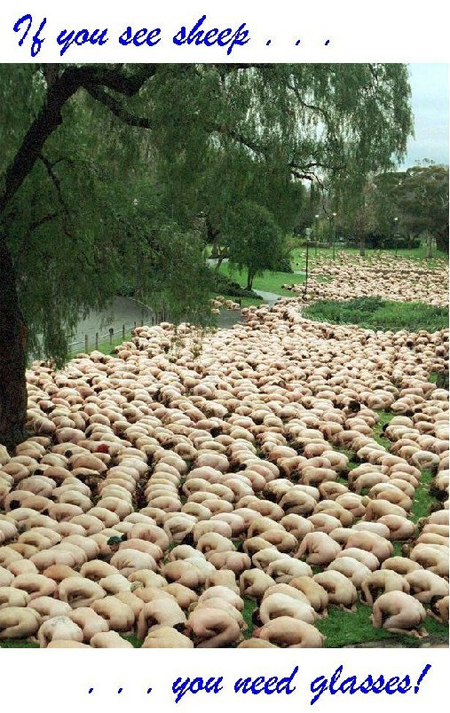
Posted by Steve Durbin on April 13th, 2007
It seems I’ve been seeing more and more theme cookbooks these days. I almost never look at them. And I’m not proposing that we create a compilation of “Favorite recipes from Art and Perception.” I am interested not so much in what you cook as in how you cook.
My question: Is there any connection between how you cook and how you do art?
I don’t mean to suppose that my plates have heaping mountains of textures while David’s meals are more flattened shapes like Chinese roadkill, or that Rex dines on charred tidbits while Sunil’s dishes are drenched in ketchup and mustard.
It’s more about approach, about your fundamental relation to your creations. Do your art and your cooking reveal two entirely different yous? Or is your life a seamless whole that reflects your intuitive grasp of the universe?
Are you always trying new dishes? Are they invented by you or from a cookbook? Do you follow recipes precisely? At all? Do you like to use exotic ingredients? Do specialized kitchen tools turn you on? How do you recharge your culinary batteries when you hit a slump?
I’ll provide some of my own answers, but first I have to go and make breakfast.
By the way, got any good recipes?
Posted by Sunil Gangadharan on April 12th, 2007
As we age and journey through life, our faces slowly begin to accumulate what I might call the ‘etchings of time’. All of those wrinkles, folds, creases and crevices lend credence to experiences borne by the individual. Personally, depicting age and wrinkle lines on a face is challenging and it is with some measure of trepidation that I undertook to work on these, one of an indigenous person and the other of my grandmother.
Both were painted from photographs.
The indigenous person, I remember finding the photo on a travel website. I liked the grace, poise and the untold stories in the individuals face and decided to paint it… I photographed my grandmother a couple of weeks back with the resolve that if I did manage to pull off a good one, maybe I will try and paint it.
See, some painting for a change and no questions…

Title: ‘Tangata whenua’; Size: 4 feet high X 3 feet wide; Medium: Oil on canvas
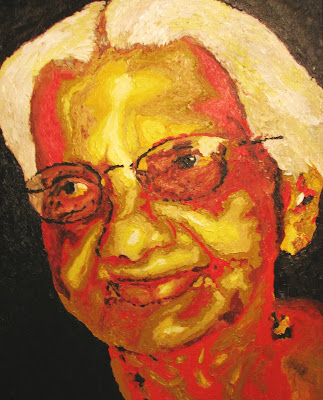
Title: ‘Sandhya Ragam’; Size: 2.5 feet high X 2 feet wide; Medium: Oil on canvas
Posted by Arthur Whitman on April 11th, 2007
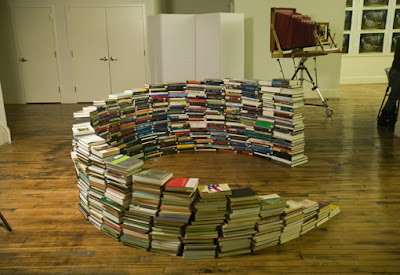
A controversial sculpture by “book artist” and Cornell University Art Department head Buzz Spector. The C-shaped structure is made up of over 800 books, all of them authored by Cornell faculty, students or alumni. The piece was originally installed in downtown Manhattan (pictured above); recently, it was reconstructed here in Ithaca, New York. More information, pictures, and an installation video can be found here.
Any thoughts?
Posted by Steve Durbin on April 10th, 2007
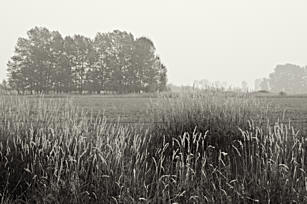 Here’s a curious tale for you: A week ago I was approached by someone interested in art collecting and in art blogging, and particularly in the interaction of the two. The C, as I shall call this beginning collector, put forward the interesting speculation that blogged artworks acquire “an aura of fame” that potentially makes them more salable. Whether that’s true or not, it probably doesn’t hurt the value of an artwork for it to be blogged.
Here’s a curious tale for you: A week ago I was approached by someone interested in art collecting and in art blogging, and particularly in the interaction of the two. The C, as I shall call this beginning collector, put forward the interesting speculation that blogged artworks acquire “an aura of fame” that potentially makes them more salable. Whether that’s true or not, it probably doesn’t hurt the value of an artwork for it to be blogged.
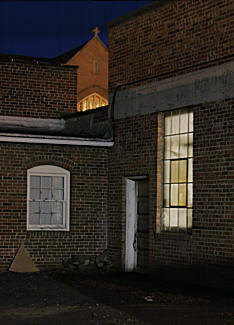 It happens that A&P had come to the C’s attention, and as a way of getting hirs feet wet, the C is considering buying perhaps half a dozen prints of images that have appeared in my posts. My prints are cheap; I’m sure I wouldn’t be writing this post if your paintings, linoleums, quilts, etc. were the same! (But maybe they’ll be next.) The C had good timing, in that just a few days ago I met with a local gallery owner who was enthusiastic about showing my work in her gallery. If that works out, my prices will have to go up, at least for work being sold by the gallery. (Also, the C didn’t know it, but I currently give an unadvertised 20% discount on purchases after the first.)
It happens that A&P had come to the C’s attention, and as a way of getting hirs feet wet, the C is considering buying perhaps half a dozen prints of images that have appeared in my posts. My prints are cheap; I’m sure I wouldn’t be writing this post if your paintings, linoleums, quilts, etc. were the same! (But maybe they’ll be next.) The C had good timing, in that just a few days ago I met with a local gallery owner who was enthusiastic about showing my work in her gallery. If that works out, my prices will have to go up, at least for work being sold by the gallery. (Also, the C didn’t know it, but I currently give an unadvertised 20% discount on purchases after the first.)
more… »
Posted by Karl Zipser on April 9th, 2007

Painting
From Life vs.
From Photos
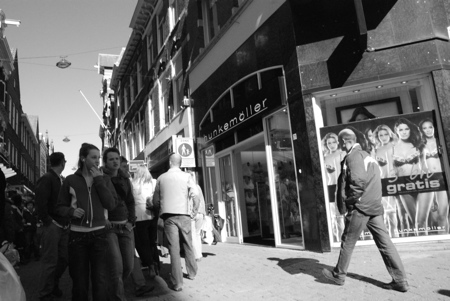
Art dealers are not shop keepers. As Edward Winkleman writes, “Saying a dealer is just a shopkeeper might make someone feel superior, but it hardly accurately describes the job.”
Why do I say dealers are artists? Well, try this: come up with a definition of what artist means today (a serious definition) that will encompass conceptual artists and installation artists and others working in non-traditional media, and I think you will find that it is hard to exclude dealers, at least the better ones, from the category of artist. Dealers can make art from objects that would not be considered art otherwise. Dealers create a program in the medium of art, the program itself is art.
‘Artist’ is generally considered to be an honorable title, for someone who does it well. Why then are the dealers not rushing to claim label? I notice a pretty conspicuous silence, in fact. What’s the deal?
Here is my guess: dealers don’t need to claim the title of artist, because they already have the substance, the power of artists. Calling themselves artists would create some awkwardness — it would put all those other artists in the dealer’s program into an almost assistant-like position, explicitly. Why agitate the artists more than necessary? Also, calling themselves artists would open the dealers up to a whole class of art criticism that is avoided by declining the title, ‘artist’.
If dealers are artists, it poses a challenging question to self-proclaimed artists: Why am I not also using art as a medium? If art dealing is an art form — and a pretty important one — then why are we letting the dealers have all the fun?







